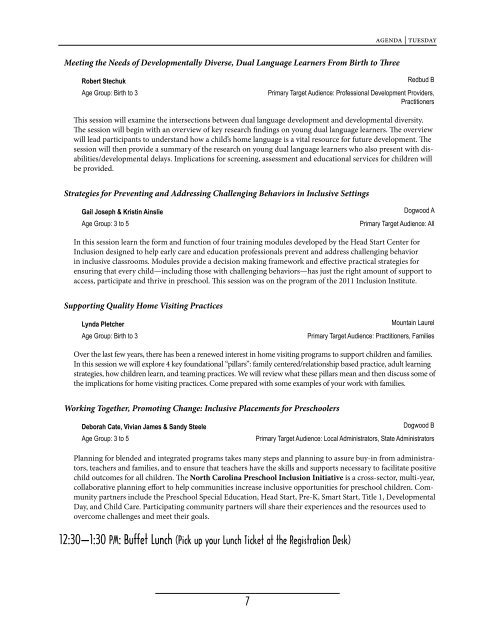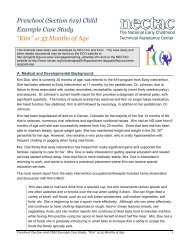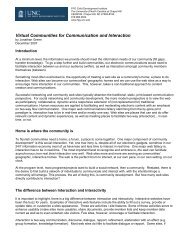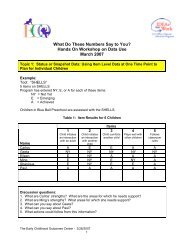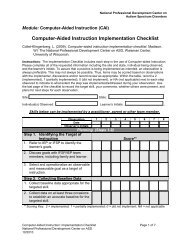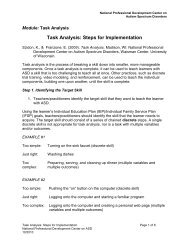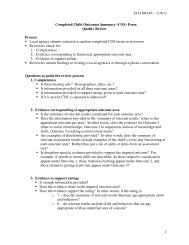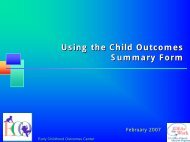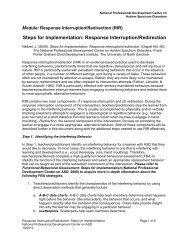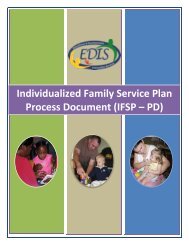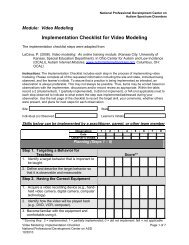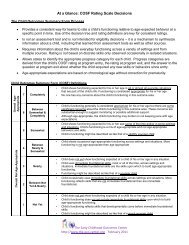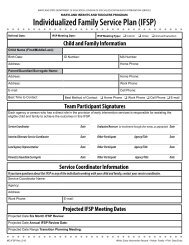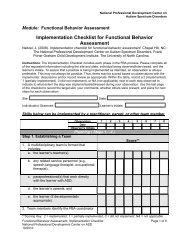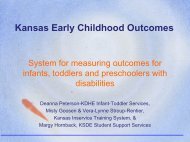12th National Early Childhood Inclusion Institute Program
12th National Early Childhood Inclusion Institute Program
12th National Early Childhood Inclusion Institute Program
Create successful ePaper yourself
Turn your PDF publications into a flip-book with our unique Google optimized e-Paper software.
agenda | tuesday<br />
Meeting the Needs of Developmentally Diverse, Dual Language Learners From Birth to Three<br />
Robert Stechuk<br />
Age Group: Birth to 3<br />
Redbud B<br />
Primary Target Audience: Professional Development Providers,<br />
Practitioners<br />
This session will examine the intersections between dual language development and developmental diversity.<br />
The session will begin with an overview of key research findings on young dual language learners. The overview<br />
will lead participants to understand how a child’s home language is a vital resource for future development. The<br />
session will then provide a summary of the research on young dual language learners who also present with disabilities/developmental<br />
delays. Implications for screening, assessment and educational services for children will<br />
be provided.<br />
Strategies for Preventing and Addressing Challenging Behaviors in Inclusive Settings<br />
Gail Joseph & Kristin Ainslie<br />
Age Group: 3 to 5<br />
Dogwood A<br />
Primary Target Audience: All<br />
In this session learn the form and function of four training modules developed by the Head Start Center for<br />
<strong>Inclusion</strong> designed to help early care and education professionals prevent and address challenging behavior<br />
in inclusive classrooms. Modules provide a decision making framework and effective practical strategies for<br />
ensuring that every child—including those with challenging behaviors—has just the right amount of support to<br />
access, participate and thrive in preschool. This session was on the program of the 2011 <strong>Inclusion</strong> <strong>Institute</strong>.<br />
Supporting Quality Home Visiting Practices<br />
Lynda Pletcher<br />
Age Group: Birth to 3<br />
Mountain Laurel<br />
Primary Target Audience: Practitioners, Families<br />
Over the last few years, there has been a renewed interest in home visiting programs to support children and families.<br />
In this session we will explore 4 key foundational “pillars”: family centered/relationship based practice, adult learning<br />
strategies, how children learn, and teaming practices. We will review what these pillars mean and then discuss some of<br />
the implications for home visiting practices. Come prepared with some examples of your work with families.<br />
Working Together, Promoting Change: Inclusive Placements for Preschoolers<br />
Deborah Cate, Vivian James & Sandy Steele<br />
Age Group: 3 to 5<br />
Dogwood B<br />
Primary Target Audience: Local Administrators, State Administrators<br />
Planning for blended and integrated programs takes many steps and planning to assure buy-in from administrators,<br />
teachers and families, and to ensure that teachers have the skills and supports necessary to facilitate positive<br />
child outcomes for all children. The North Carolina Preschool <strong>Inclusion</strong> Initiative is a cross-sector, multi-year,<br />
collaborative planning effort to help communities increase inclusive opportunities for preschool children. Community<br />
partners include the Preschool Special Education, Head Start, Pre-K, Smart Start, Title 1, Developmental<br />
Day, and Child Care. Participating community partners will share their experiences and the resources used to<br />
overcome challenges and meet their goals.<br />
12:30–1:30 pm: Buffet Lunch (Pick up your Lunch Ticket at the Registration Desk)<br />
7


